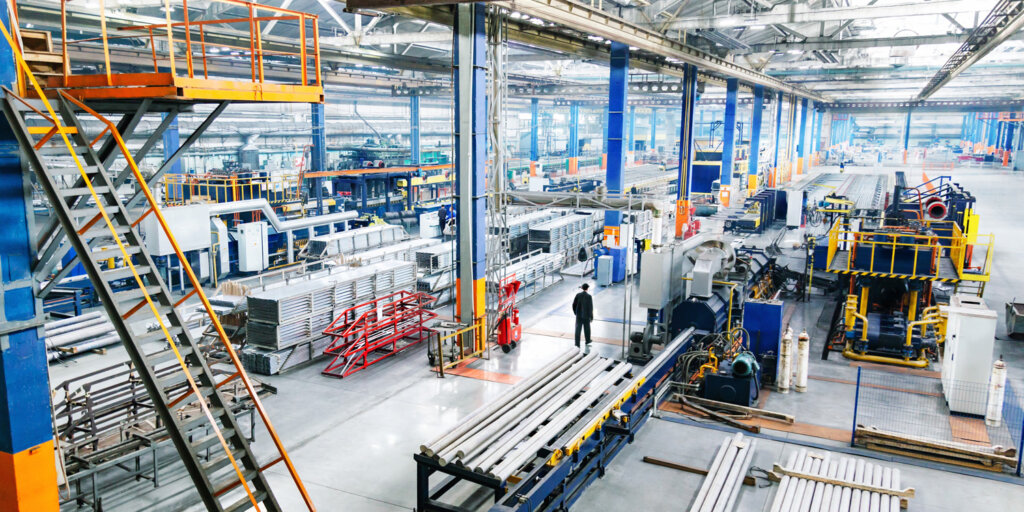Home » Producing results: 5 companies bringing novel manufacturing solutions to North America
Producing results: 5 companies bringing novel manufacturing solutions to North America

Startups in the latest Innovate UK cohort are helping improve quality control, provide efficient delivery systems and keep machinery in tip-top shape.
Advanced manufacturing uses innovative tech to untangle some of the knottiest problems that hamper large-scale production across various sectors — and throughout the supply chain. The companies in the latest collaborative endeavour between MaRS and economic development agency Innovate UK are leaders in this realm, applying their novel solutions to aviation propulsion, fabric optimization, safety compliance software, maintenance sensors and unmanned aerial vehicle solutions. While their areas of specialization run the gamut, a common goal unites these startups: all five are committed to creating a safer and more sustainable future.
As MaRS cohorts manager Hadeer Abdelhamid points out, there’s tremendous excitement about engaging these ventures here at home. “Canada has a massive advanced manufacturing market, and we can’t wait to see this cohort integrate their innovative technologies,” she says. Participants in the program gain access to advisory support, capital, talent and customer connections, market data and insights, networking and workshops, as well as PR and marketing exposure. The overarching goal is to help them gain a foothold in the Canadian market, with the hope of accelerating the companies’ next steps into North America and beyond.
To get a better sense of all five members of the latest advanced manufacturing cohort, read on.
Streamlining compliance: Agile Group Systems and Services
Agile Group Systems and Services helps manufacturers seamlessly monitor quality control, health and safety compliance and budget parameters without diverting resources from the core task of building products. Agile’s software, Singlepoint, can be tailored to the unique complexities of each user’s processes, which allows the company to work with clients in a range of industries — from aerospace and automotive to pharma and fossil fuels.
Developing quieter drones: Greenjets
Drones may be small, but they sure make a lot of noise. Greenjets wants to muffle that din. Where traditional drones have exposed propellers that create a noticeable high-pitched buzz, Greenjets encloses its propulsion systems inside a duct — not unlike the engine on a passenger jet. Not only does this improve efficiency and cuts down on noise, but the duct protects blades from hazards like tree branches and birds. The company’s technology can also be applied to air taxis and larger fixed-wing manned aircraft.
Cutting costly downtime: IVY TECH
For manufacturers, time is money, which means any sort of downtime on the factory floor can compromise revenue (and, ultimately, a company’s reputation). IVY TECH works with producers of automotive parts, industrial chemicals and medical supplies to keep their multi-million dollar equipment in tip-top shape — warding off breakdowns before they happen. The company’s systems use sensors to track everything from vibration and acoustics to energy usage and temperature, all of which can be monitored from an intuitive dashboard. It’s effectively “a fitbit for machines in factories,” says Shehan Lowe, IVY TECH’s technology foresight manager, who notes that operators can use this data to proactively plan maintenance and calibration — which, in turn, improves efficiency and reduces the environmental impact of factory operations.
Connecting businesses from above: Sky-Drones
Sky-Drones is taking the technical need-to-know out of unmanned aerial vehicle usage. With the touch of a button, the company’s AI-equipped vehicles, which it manufactures, can map out and fly a pre-designated route. The tech has numerous potential applications: It could be used by mining companies looking to access operations in hard-to-reach outposts when roads are out of service, healthcare networks racing to transport time-sensitive samples between facilities, or farmers tending fields that would be compromised by the weight of a tractor. Next year, the Ministry of Transportation will ease restrictions on “beyond visual line-of-sight” (BVLOS) operations, meaning drones can be used for long-haul flights for package delivery and remote community access.
Supporting sustainable style: ZERØTEC
Fashion has an outsized environmental footprint. The industry’s design and manufacturing processes leave heaps of material on the cutting-room floor, all of which winds up in landfills. ZERØTEC has developed a machine learning–powered pattern development software that lets designers create new looks while monitoring fabric use, sustainability and cost overruns. Think of it like AutoCAD, but for clothes. “One of the greatest obstacles we have worked to remove is the misconception that sustainability has to be expensive,” says ZERØTEC founder Nicholas Betts. “We help users save $3.50 and two kilograms of carbon for every garment made.”
Learn more about the Innovate UK and MaRS collaboration.
Image source: Adobe Stock
MaRS Discovery District
https://www.marsdd.com/
MaRS is the world's largest urban innovation hub in Toronto that supports startups in the health, cleantech, fintech, and enterprise sectors. When MaRS opened in 2005 this concept of urban innovation was an untested theory. Today, it’s reshaping cities around the world. MaRS has been at the forefront of a wave of change that extends from Melbourne to Amsterdam and runs through San Francisco, London, Medellín, Los Angeles, Paris and New York. These global cities are now striving to create what we have in Toronto: a dense innovation district that co-locates universities, startups, corporates and investors. In this increasingly competitive landscape, scale matters more than ever – the best talent is attracted to the brightest innovation hotspots.


